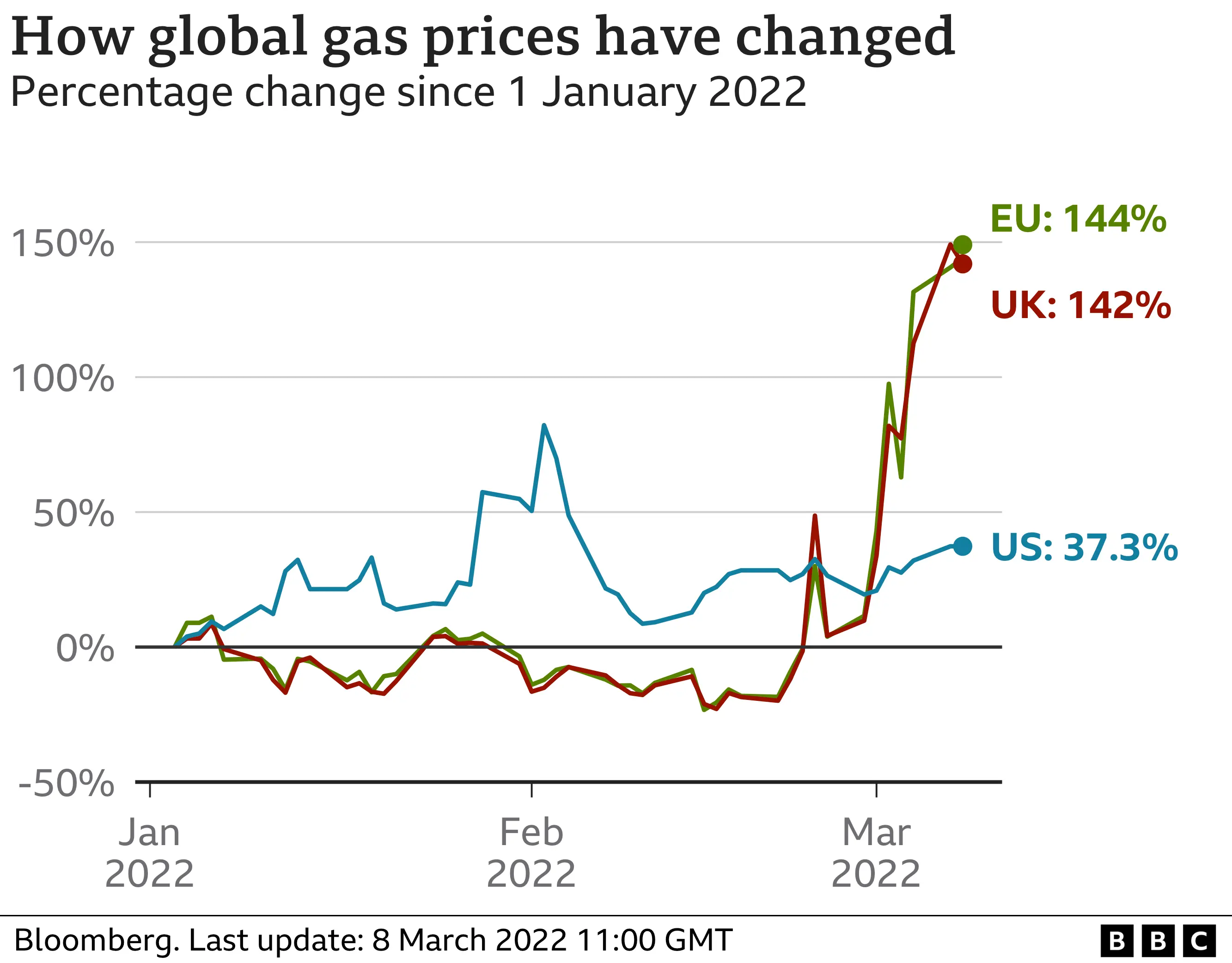Labour: Overhaul energy plan to tackle price hikes
Labour has demanded an overhaul of plans to tackle energy costs, saying UK household bills should "never again [be] at the mercy of a dictator".
Sir Keir Starmer said schemes announced by No 10 before Russia's invasion of Ukraine had been "a big gamble" made in the hope prices would drop.
But he said as oil and gas costs grow, "the bet...looks certain to fail".
Boris Johnson said the government had put forward "unprecedented measures" to help families.
And he pledged to bring forward an "energy independence plan" to ensure the UK was prepared for long-term needs.
The cost of living crisis has hit households across the country, as the prices of energy, fuel and food have all seen big hikes since the pandemic.
Chancellor Rishi Sunak outlined plans in February to tackle the average rise of £693 in energy due in April, promising payments of £350 to households to help.
But only £150, targeted to help with council tax bills, will arrive before the hike, and the other £200 - due to be paid in October - is a loan that will have to be paid back in instalments over five years.
The invasion of Ukraine, and the subsequent sanctions imposed on Russia, have also seen wholesale prices increase, meaning fears of further bill hikes.
'Bumper profits'
Speaking at Prime Minister's Questions, Sir Keir accused Mr Johnson of not understanding "the mess he is in" over the cost of living.
He called for a u-turn over what he called the "forced" £200 loan from the chancellor, and reiterated Labour's demand for a windfall tax on the profits of oil and gas companies to give support to households that need it.
"Before Russia invaded Ukraine, North Sea oil and gas companies were making bumper profits," the Labour leader said.
"In their own words, more money than they know what to do with.
"Since then the international price of oil and gas has skyrocketed and so will their profits.
"When will the prime minister admit he has got this badly wrong, put a windfall tax on those super profits and use the money to cut household energy bills?"
Mr Johnson said Sir Keir was "absolutely out of his mind" to suggest a u-turn on the chancellor's support scheme, and claimed any windfall tax would lead to firm just putting their prices up further.
Instead he said the government would "take a sober, responsible approach" and "end our dependence on hydrocarbons altogether" - especially those from Russia.
The PM pledged to invest in nuclear power and renewables - moves supported by Labour - and while there will be "dark days ahead and difficult times" during the Ukraine invasion, "we will come through it stronger".
And Sir Keir said, while there will be "costs here at home, we can withstand those costs, and we must... by starting a new era of energy policy, never again at the mercy of a dictator".


After a week when much Parliamentary attention has, understandably, been looking overseas, Sir Keir Starmer used PMQs to put some focus on challenges at home over the cost of living.
At PMQs, he used his questions to suggest what Labour would do differently, by talking about taxing the profits of oil and gas companies.
Boris Johnson is standing by the government's solution of providing rebates and loans to households; his argument against taxing companies more: that it would lead to more price rises.
Both men will be aware that this month and next are when many of the increases will hit people's pockets at the same time.
It seems clear that more will need to be done to help people cope with increasing costs.
The question is 'what?'

'Wrong thing to do'
Following PMQs, Business Secretary Kwasi Kwarteng outlined the government's plan for phasing out Russian oil imports to the UK by the end of 2022.
The move was announced on Tuesday as western nations co-ordinated action to end their reliance on Russian energy, in the latest escalation of their economic response to the invasion of Ukraine.
Russian imports account for 8% of total oil demand and 4% of gas supply in the UK.
While this is much less than the UK's European allies, "turning off domestic production" of oil and gas "would be completely the wrong thing to do", Mr Kwarteng said.
He told MPs the government would look to replace Russian energy imports with an increase from other sources before the end of the year.


Mr Kwarteng also suggested the government could review the idea of fracking, a controversial method of shale gas mining.
He said the government would "support shale gas exploration if it can be done in a safe and sustainable way".
He said the decision to seal the UK's only two shale gas wells "didn't necessarily make any sense", adding "we're still in conversations about that".
The government halted fracking in 2019 after scientists raised concerns about earthquakes and "unacceptable" risks to local communities.
A group of Conservative MPs has urged the government to end the ban, arguing more UK gas production could lower energy prices and reduce Europe's dependence on Russian fossil fuels.
Labour does not support lifting the ban on fracking, which it says would not solve the problems the UK faces.
